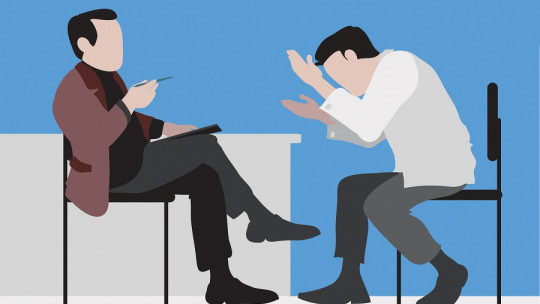
Does going to a psychologist work? There are still people who say they “don’t believe” in psychology or who claim that “going to a psychologist is crazy.” Nothing is further from reality. Psychology is not a belief that you can have or not have, psychology is a science, a discipline with a solid scientific basis and a health profession recognized by the system like all the others. Obviously, going to the psychologist works. There are validated evaluation methods and effective treatment protocols with scientific evidence.
Now, psychology is not magic and it does not solve everything for everyone. It is interesting to know what areas it works in, what type of problems it solves and for what situations it is indicated to go to these professionals. How do you know when to go to the psychologist? In this PsychologyFor article you will find 30 reasons for which you do need to see a psychologist.
What is a psychologist
A psychology professional is a person with university studies who has completed the bachelor’s or psychology degree. Psychology is the science that studies mental processes and behavior of people. As people go through different stages during life and have several areas or facets, there are also different specialties of psychology, which address each of these divisions. Among them, we find clinical or health psychology, educational, sports, work and organizations, social, community, forensic, experimental, neuropsychology… Within clinical psychology we find different specialties depending on the type of patient it treats, such as child, youth, adult psychology, psychogerontology, specialized in personality disorders, abuse, self-esteem…
In addition to all these specializations, it is very important to know that in psychology there are different currents or approaches. Although its objective is the same: to study mental and behavioral phenomena to intervene to promote psychological well-being, this can be done following quite different, although equally valid, methods and techniques. They are different perspectives and ways of working.
Depending on your needs and your objectives, you should look for one type of professional or another. Next we will see when to go to the psychologist.

How to know if I need to go to the psychologist
How do I know if I have to go to the psychologist? First of all, you should know that going to the psychologist can be useful in any situation. It will always be beneficial for you to know yourself more and learn about your psychological processes, analyze your thoughts and manage your emotions. However, there are a series of reasons to go to a psychologist, some specific situations in which it is better to consult with a professional. What is the point of going to the psychologist? Below we will see in which cases it is important to consult with a psychology professional:
- You hurt yourself or you hurt others. Whether physical or verbal aggression, in the form of self-aggression or hetero-aggression, they must stop as soon as possible. A psychologist will carry out an evaluation of your personality and your current situation to find the cause of this behavior and teach you strategies to manage your emotions and develop self-control. Furthermore, attacks leave psychological consequences that must be treated by professionals.
- You have experienced a situation of abuse or violence: There are many types of violence, from domestic violence to sexual assault, including workplace harassment. Professional help will be useful to rebuild your self-esteem and provide you with self-care strategies.
- You have experienced a traumatic situation: From an attack to a traffic accident, the support of a psychologist will help you process the event and deal with possible post-traumatic symptoms.
- You have suffered a loss: It may be that a family member dies, that you lose your job or that you have to emigrate. When there is a great loss, mourning is necessary. Psychological help will be useful to go through the grieving process in a healthier way.
- You have received a shocking diagnosis: The diagnosis of a serious illness, for example, involves many changes and losses, which is why it still requires grief, which will be best navigated with tools and professional support. That is why, for example, psycho-oncology exists.
- You have sleep problems: You have been sleeping too little or too much for a while and this is not usual for you. Both sleeping too many hours (hypersomnia) and difficulty sleeping (insomnia) are symptoms that may indicate a psychological problem or disorder. It is always better to consult with a professional.
- Your appetite has changed drastically: another indicator of how we are doing is our appetite. As in the previous case, whether you feel much more hungry than usual or much less, they may be signs of psychological problems or disorders and it is worth carrying out a professional assessment.
- You feel very tired: This is another of the characteristic symptoms of psychological disorders. In this article we see the reasons for fatigue and its relationship with psychopathology.
- You don’t feel like doing anything: Lack of interest, motivation and willingness to perform tasks are typical symptoms of depressive disorders, but also of dementia, among other conditions. Therefore, the best option is to consult with a professional.
- You find it difficult to concentrate and make decisions: If you feel difficulty when thinking, reasoning or making decisions, consult a professional, as it may be a symptom of psychological disorders.
- You have memory problems: The lack of memory or the perception of it is also a symptom of psychological problems and diseases, which can range from an episode of stress to the onset of Alzheimer’s disease, so it is worth consulting with specialists.
- You feel much more energy than usual: if you feel that you think faster than normal (tachypsychia), that you have a lot of energy, that you do not need to sleep and you feel very capable of carrying out complex projects, it may be that you are having a psychological episode or disorder.
- There are things that worry you a lot: You feel like you worry much more than others and there are certain issues that overwhelm you so much that they interfere with your daily life. You spend a lot of time thinking about the same topic and you usually feel nervous.
- There is some specific situation that overwhelms you: You have a peak of stress due to family problems, job changes, exams, a breakup, a move… any event that is difficult for you to manage. A professional will teach you relaxation techniques, emotional management, cognitive restructuring, stress management or whatever your particular case needs.
- You cannot develop your life normally: There are issues that interfere with your normal daily life. For example, you have a fear that prevents you from having a healthy social life or your emotional state prevents you from carrying out your work tasks.
- You can’t enjoy life: Another reason why you should consult a professional is not being able to enjoy life. Anhedonia or the inability to feel pleasure and enjoy activities that were previously enjoyed (hobbies, sexuality…) is another psychopathological symptom that is worth investigating.
- Your mood changes constantly: you feel like you have no middle ground, you always explode, you can’t achieve balance in your life… emotional instability is very annoying and a warning sign that can indicate certain psychological disorders, such as borderline personality disorder. Consulting with a professional is necessary to receive an assessment of your specific case.
- Do you have problems with your partner that you can’t handle: whether they are communication problems, sexual problems or any situation that you feel you don’t have the tools to handle. Having psychological help will be really useful to discover the origin of the problems and achieve an understanding.
- You don’t want to be with your partner but you can’t leave them. If the relationship with your partner does not bring you well-being, if you do not feel loved and do not want to continue with the relationship, if there is discomfort, but you cannot leave him/her, you may find yourself in a situation of emotional dependence. Professional help is key to ending the false myths of romantic love, to reinforce your self-esteem and get out of unhealthy relationships, to be able to build healthy and beneficial relationships.
- You haven’t had a partner for a long time despite looking for one: you feel discomfort due to the fact that you don’t have a partner and you have been looking for one for a long time. This desire may be born from fear of loneliness, your relational patterns may be maladaptive and your relationships may not be successful… It may be due to many factors that a professional will be able to identify and help you treat.
- You have problems at work: you do not feel comfortable with the work you do, you endure a heavy workload, but you also do not know how to set limits, you are involved in a bad work environment… Any complicated situation that you experience at work will require strategies to manage it and a A psychology professional can help you acquire them.
- You don’t have friends and that worries you: Another occasion in which it is necessary to go to the psychologist is when there is no social area. We are social beings and we need to have a support network, share with other people, feel accompanied and part of a group. Therefore, it is possible that not having friends makes you uncomfortable. Some personality traits may make it difficult to build deep relationships or you may need to train your social skills, among many other reasons. Whatever it may be, psychological help will be key to overcoming this situation.
- You lose your temper with your children often: just as in the role of a couple, in the role of father or mother, our vulnerabilities can be observed. Parenting is a complex task that requires psychological balance and many skills. In this article we explain the reasons for continued anger with sons and daughters.
- You compare yourself to others constantly: comparison is a sign that your self-esteem is negative and/or unstable. Going to a psychologist will help you know yourself, accept yourself and respect yourself, thus building healthy self-esteem. Self-esteem is the central axis that supports our psychological well-being and it is very important to work on it.
- Do you have an addiction: substance use, pathological gambling, compulsive shopping, work addiction… There are addictions of many types, psychological disorders with serious consequences that need psychological treatment.
- Your environment recommends it to you. There are many psychopathological symptoms that go unnoticed by the person who presents them or who are not able to observe their importance. If several close people suggest you go to a professional, that is a reason to do so. At the very least, consult to have a professional assessment of the situation.
- You don’t know how to guide your life. When to go to the psychologist? When you don’t know what you like, you are passionate about nothing, you don’t know what to study, what kind of job to look for, you feel lost, overwhelmed, you don’t know what you want to do with your life… You may be going through an existential crisis and that a psychologist can help you get to know yourself, find yourself again and clarify your ideas.
- You have unhealthy habits: tobacco, alcohol, junk food, sedentary life…, do you feel identified? Self-esteem is not saying how good you look in the mirror, self-esteem is taking care of yourself physically and emotionally, respecting your body and acting in accordance with what is best for you and your health. Substance use, poor diet, personal neglect, watching television in an unproductive manner, etc., are habits that denote self-esteem problems and that also serve to camouflage deficiencies or avoid psychological problems that have not been managed. One of the tasks of psychologists is to promote health, help stop unhealthy habits and implement healthy habits, solving the underlying discomfort with adaptive strategies.
- You want to know and understand yourself better. Going to a psychologist will help you know what you are like, analyze your thoughts, feel your emotions and understand your behaviors. You will discover emotional burdens that perhaps you didn’t even know you had, but that were conditioning your way of acting. You will be able to heal, improve and live more consciously and more in line with your values and beliefs. In short, going to the psychologist will help you have a better life.
- Do you want to treat patients?: in case you want to dedicate yourself to clinical or health psychology and you want to work as a psychotherapist caring for patients (or even as coach serving clients) I believe it is absolutely essential to go through a psychotherapy process to know yourself in depth, to be aware of your own internal issues to be able to manage them so that they do not interfere with therapy, thus being a good professional.
In this article we have talked about the reasons for going to the psychologist regarding young people, adults or seniors. We address the case of infants in another article in which we explain when to go to the child psychologist.

How to choose a good psychologist
If you have identified with some of the previous points, you may have decided to start a psychotherapy process with a professional. To choose a good psychologist, we must take into account several requirements:
- Regulated academic training. A person who is professionally dedicated to psychology, regardless of the branch or in whatever form, must have the official title of Graduate or Bachelor in Psychology. Additionally, within each specialty, other degrees may be required. For example, in Spain, current legislation dictates that to practice psychology in the health field you must have a Master’s Degree in General Health Psychology or the title of Specialist in Clinical Psychology through PIR (Resident Internal Psychologist) training. .
- Specialization. In addition to academic training, another factor to take into account when choosing a professional is that he or she is specialized in the specific area that has to do with your problem. That is, it is dedicated to a specific type of patient, an area or a specific stage of life. As we have seen, psychology is very broad and a psychologist who is dedicated to forensic psychology may not know how to intervene with people with dementia or with infants with academic difficulties. It is important to know what type of professional to look for based on the problem presented. For example, a professional specialized in educational psychology, if it involves learning problems; in adult clinical psychology, when it comes to psychological disorders of anxiety, depression, personality disorders…; or in couples therapy, if your consultation is about problems in your relationship.
- Update. Another relevant factor is that the psychology professional is up to date. Psychology is a relatively new science that is constantly growing and changing based on the results of research that is constantly being carried out. Therefore, psychology professionals must be informed of recent studies.
- Comfort. An essential requirement is that the professional conveys confidence in you. Most likely, you will not fit in with all the professionals and the way each of them works. So, if you are not comfortable with a professional, if you do not trust their techniques or feel that their methods do not work for you, do not hesitate to discuss it and look for another professional if necessary. A good professional can recommend or refer you to other professionals who work more according to your needs.
What is it like to go to the psychologist for the first time?
In the first consultation with the psychologist, a presentation and evaluation session is usually carried out. Most likely, the professional will ask you about your reason for consultation for your current situation and the evolution of the problem with the aim of collecting the main information.
For his part, the professional will also explain how the psychotherapy process works. He will present his vision of the problem or situation presented and how it can be worked on. He will explain to you what the process will be like. assessment and what techniques will be used (tests, interviews, consultations, medical tests…) to reach a diagnosis or the cause and explanation of the problem presented. It will also explain what options treatment There are different techniques and methods that can be used to solve and improve the different aspects of the problem.
During the first sessions, the symptoms you present and your personality traits will be evaluated to make a “psychological x-ray” of you, both your way of being and your current problem. In this way, the psychologist will be able to adapt the techniques to what works best for you. Together you will establish some goals which will be the initial lines of work, although new objectives often appear throughout the process.
When you go to the psychologist for the first time, you should also observe the factors mentioned above on how to choose a good professional.

Why go to the psychologist
What are the benefits of going to a psychologist? Below we will see, broadly speaking, the main reasons for going to the psychologist:
- We do not receive sufficient emotional education. We all have emotions, but we have no idea how they work. Just as we have thoughts and behave in ways that we sometimes don’t like. Because? In general, we have no idea how the mind works and that means we do not understand our way of thinking, feeling and acting. Going to the psychologist provides all this information.
- We can stop suffering. Change is possible, but it is not easy. It requires knowledge, time and practice. There are many psychological disorders that have established effective treatments and many problems that can be solved through psychological techniques. Therefore, going to the psychologist is always good.
- We need to know ourselves. It is essential to know who we are and why we are like this. Going to a psychology professional brings light and clarity to these issues.
- We need to regulate ourselves. We need to learn to manage our emotions in a healthier and more functional way, since it is the way to relate to ourselves and the world respectfully and positively.
- We deserve to live in peace. The main reason to go to a psychologist or any other health professional is that you deserve to live with welfare. Going to the psychologist is one more way to take care of yourself, just like nourishing yourself in a healthy way or carrying out appropriate medical check-ups. Remember that Health is the most important.
When to stop going to the psychologist
One of the most frequently asked questions is how long psychological treatment lasts and when you can stop going to the psychologist. These questions do not have an exact answer.
It is not necessary to stop going to the psychologist, although the sessions usually end when the person has completed sufficient learning has incorporated quite a few strategies and has made the necessary changes to be able to cope on one’s own the situations that come.
Depending on the person and, above all, depending on their pathology (or problem), the duration of the therapy will be one or another. For example, there is brief therapy, which takes less than 20 sessions (normally, close to 10 sessions), which would be between approximately 2 and 4 months. Since, according to the creators of brief strategic therapy, changes can be seen around 7 sessions. On the other hand, however, a depressive episode usually requires between 9 and 12 months of treatment, and it can be much longer in cases of recurrence or resistance.
It will also depend on the collaboration or non-collaboration of both the patient and their close environment and their adherence to the treatment. That is, whether the sessions and assigned tasks are completed.
In short, the psychologist is a health professional that you should go to and to whom you must have the right to go. whenever necessary.
This article is merely informative, at PsychologyFor we do not have the power to make a diagnosis or recommend a treatment. We invite you to go to a psychologist to treat your particular case.
If you want to read more articles similar to How to know when to go to the psychologist we recommend that you enter our Clinical Psychology category.
Bibliography
- American Psychiatric Association. (2014). Diagnostic and Statistical Manual of Mental Disorders: DSM-5. Madrid: Panamericana Medical Editorial.
- Caballo, VE, Buela-Casal, G., and Sierra, JC (1996). Evaluation manual in clinical and health psychology. XXI Century of Spain Editors.
- Ortiz, M. Á. C., Ucles, IMR and del Barrio Gandara, V. (2013). Clinical evaluation: diagnosis, formulation and contrast of psychological disorders. Sanz and Torres.
- Vallejo, M.A. (1998). Behavior therapy manual. Madrid: Dykinson, Vols I and II.
- Watzlawick, P., & Nardone, G. (1997). Strategic brief therapy. Curtain.








